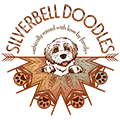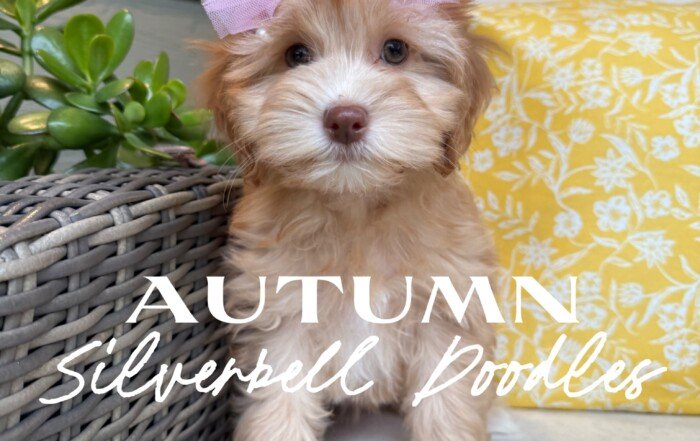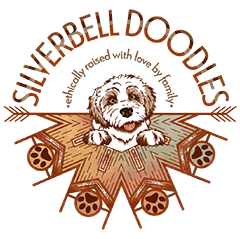Best Food for Small Doodle Puppies: Complete Nutrition Guide for Cavapoos, Cockapoos, Schnoodles & Schnockerpoos

As a new small Doodle puppy parent, one of the most important decisions you’ll make is what to feed your fluffy bundle of joy. The right nutrition during your puppy’s first year lays the foundation for a lifetime of health, affecting everything from coat quality to joint development and immune function. At SilverBell Doodles, we’ve raised generations of healthy, vibrant Cavapoos, Cockapoos, Schnoodles, and Schnockerpoos, and we’re sharing our expertise on the best food for Doodle puppies to help you make informed choices for these special small breed Doodles.
| Product Name | Link |
|---|---|
| Purina Pro Plan High Protein Puppy Food DHA | https://amzn.to/41ZJs1g |
In this comprehensive guide, you’ll discover:
- Why Doodle puppies have unique nutritional needs
- How to select the best food formula for optimal growth
- Our top recommended brands and products (with real results)
- Feeding schedules based on age and size
- Common nutrition mistakes to avoid
Understanding Small Doodle Puppy Nutritional Needs
The breeds we specialize in at SilverBell Doodles—Cavapoos (Cavalier King Charles Spaniel/Poodle), Cockapoos (Cocker Spaniel/Poodle), Schnoodles (Schnauzer/Poodle), and Schnockerpoos (Schnauzer/Cocker Spaniel/Poodle)—each have unique nutritional requirements influenced by their parent breeds.
What makes small Doodle puppies unique when it comes to nutrition?
- Metabolism rate: Small Doodle breeds like Cavapoos and Cockapoos have faster metabolisms than larger dogs, requiring nutrient-dense foods in appropriate portions to prevent hypoglycemia (low blood sugar).
- Coat quality: The characteristic Doodle coat—often low-shedding and curly or wavy—needs specific nutrients to stay healthy. Our Schnoodles and Schnockerpoos often have particularly fine coats that show the effects of nutrition very quickly.
- Energy levels: Small Doodles like Cavapoos and Cockapoos are typically active, intelligent dogs that need sufficient calories and nutrients to fuel their playful nature and developing brains, despite their smaller size.
- Digestive sensitivity: Many small Doodles inherit digestive sensitivities from their parent breeds. Cavalier King Charles Spaniels and Miniature Schnauzers, for instance, can be prone to various digestive issues that may affect their Cavapoo and Schnoodle offspring.
“The food you choose for your small Doodle puppy isn’t just about keeping them full—it’s the building blocks for their entire body during this critical growth period. While these principles apply to all dogs, our specialized small Doodle breeds have particular requirements that need attention.” — SilverBell Doodles Veterinary Consultant
Key Nutrients for Healthy Development
Protein: The Building Block
Protein is crucial for growing puppies as it provides the essential amino acids needed for muscle development, immune function, and healthy skin and coat. For Doodle puppies, look for food with:
- Protein content: 22-30% (depending on size and activity level)
- Quality sources: Named animal proteins like chicken, lamb, fish, or beef should be the first ingredient
- Multiple protein sources: Diverse protein sources provide a complete amino acid profile
Fats: Essential for Energy and Brain Development
Healthy fats are concentrated energy sources that support your puppy’s high metabolism and are vital for brain and nervous system development.
Key fat considerations include:
- DHA (docosahexaenoic acid): Critical for brain and vision development, often sourced from fish oil
- Balanced omega-3 and omega-6 fatty acids: Support skin health and reduce inflammation
- Fat content: Typically 15-20% for puppies
Carbohydrates: Energy for Active Puppies
While dogs can survive without carbohydrates, quality sources provide energy, fiber, and essential nutrients.
Look for:
- Whole grains: Brown rice, oatmeal, barley (unless your puppy requires grain-free)
- Vegetables and fruits: Sweet potatoes, peas, apples (sources of vitamins, minerals, and antioxidants)
- Avoid fillers: Corn, wheat, and soy can cause allergies in some Doodles
Vitamins and Minerals: Critical for Development
Puppies need a precise balance of vitamins and minerals to support their rapid growth:
- Calcium and phosphorus: Crucial for bone development (must be properly balanced)
- Vitamin A: Supports vision and immune function
- B vitamins: Important for energy metabolism and nervous system health
- Vitamin E: Protects cells from oxidative damage
- Zinc: Supports immune function and skin health
Puppy Food Types: Pros and Cons
Dry Kibble
Pros:
- Convenient and economical
- Helps with dental health
- Longest shelf life
- Wide variety of formulations
Cons:
- Lower moisture content
- Quality varies significantly between brands
- May contain more preservatives
Wet Food
Pros:
- High moisture content (good for hydration)
- Highly palatable for picky eaters
- Often contains fewer preservatives
Cons:
- More expensive
- Doesn’t help with dental health
- Shorter shelf life once opened
Fresh/Refrigerated Food
Pros:
- Minimally processed
- Highly digestible
- Appealing taste and texture
Cons:
- Expensive
- Requires refrigeration
- Shorter shelf life
Raw Food Diet
Pros:
- Minimal processing
- No artificial ingredients
- Can be beneficial for some allergies
Cons:
- Risk of bacterial contamination
- Nutritional balance can be difficult
- Most expensive option
- Requires careful handling
Homemade Food
Pros:
- Complete control over ingredients
- Can be tailored to specific needs
Cons:
- Time-consuming
- Risk of nutritional imbalance without expert guidance
- More expensive than commercial foods
Best Food for Doodle Puppies: Top Recommendations
After years of experience with our own Doodle puppies and feedback from hundreds of puppy parents, these are our top recommendations:
Purina Pro Plan Puppy Food with DHA Lamb & Rice Formula
Why we recommend it: This is the food we feed all SilverBell Doodle puppies before they go to their forever homes. It provides excellent nutrition with DHA for brain development, contains high-quality protein, and has a proven track record of supporting healthy growth in our puppies.
Key benefits:
- Contains DHA from fish oil for brain and vision development
- Easy-to-digest lamb and rice formula
- Supports the developing immune system
- Balanced nutrition for proper growth
See Price and Reviews on Amazon
Feeding Schedule: How Much and How Often
Proper portioning and feeding frequency are just as important as the food itself. Here’s a general guideline based on your Doodle puppy’s age:
8-12 Weeks
- Frequency: 4 meals per day
- Portion size: Follow package guidelines based on expected adult weight
- Monitoring: Weigh weekly to ensure proper growth rate
3-6 Months
- Frequency: 3 meals per day
- Portion size: Adjust based on growth and activity level
- Monitoring: Check ribs regularly – should be palpable but not visible
6-12 Months
- Frequency: 2 meals per day
- Portion size: Follow package guidelines, adjusting as needed
- Monitoring: Maintain healthy body condition; watch growth rate
After 12 Months
- Transition: Gradually switch to adult formula between 12-18 months (larger Doodles may need puppy food longer)
- Frequency: Continue 2 meals per day for life
Pro Tip: Instead of following the package guidelines exactly, use them as a starting point and adjust based on your puppy’s body condition. You should be able to feel but not see the ribs, and your puppy should have a visible waist when viewed from above.
Special Considerations for Our SilverBell Doodle Breeds
Cavapoos
- Weight range: Typically 8-20 lbs when fully grown
- Special needs:
- Prone to heart issues like their Cavalier parents, omega-3 fatty acids are beneficial
- May have sensitive digestion requiring easily digestible proteins
- Higher risk of dental issues, so kibble size and texture matter
- Need frequent meals (3-4 times daily) as puppies to prevent hypoglycemia
Cockapoos
- Weight range: Usually 12-24 lbs as adults
- Special needs:
- Often very energetic, requiring appropriate calorie content
- Can inherit ear issues from Cocker Spaniel lineage, so omega fatty acids are important
- Some can be prone to food allergies, requiring careful ingredient selection
- Typically do well on high-quality small breed formulas
Schnoodles
- Weight range: Generally 10-20 lbs (miniature variety)
- Special needs:
- May inherit pancreatitis risk from Schnauzer lineage, so moderate fat content is important
- Often benefit from food with skin and coat support
- Can be prone to dental issues, so appropriate kibble size matters
- May need more frequent meals as puppies
Schnockerpoos
- Weight range: Typically 10-25 lbs
- Special needs:
- This triple cross can have varied nutritional needs
- Watch for food sensitivities that can manifest as skin or digestive issues
- May benefit from probiotics for digestive health
- Monitor weight carefully as growth rates can vary
Note for Other Breed Owners: While this guide focuses on our specialized small Doodle breeds, the principles of quality nutrition apply to all puppies. Adjust portions and specific nutrients based on your puppy’s breed, size, and individual needs. Always consult with your veterinarian about breed-specific concerns.
Transitioning from Breeder Food
When you bring your puppy home, sudden changes in diet can cause digestive upset. Follow this transition schedule:
Days 1-3: 75% old food, 25% new food Days 4-6: 50% old food, 50% new food Days 7-9: 25% old food, 75% new foodDay 10+: 100% new food
If at any point your puppy experiences diarrhea or refuses to eat, slow down the transition.
At SilverBell Doodles, we provide a starter supply of Purina Pro Plan Puppy Food with all our puppies to help with this transition.
Common Puppy Food Myths Debunked
Myth 1: All grain-free foods are better for puppies
Fact: Unless your puppy has a specific grain allergy (rare), grain-free diets offer no proven health benefits and have been associated with certain heart issues in some dogs.
Myth 2: Puppies should have food available all day
Fact: Scheduled meals help with housetraining, prevent obesity, and allow you to monitor appetite changes that might indicate health issues.
Myth 3: Raw diets are always healthier for puppies
Fact: While some dogs thrive on raw diets, puppies have specific nutritional requirements that can be difficult to balance with raw feeding without expert guidance.
Myth 4: Higher protein is always better
Fact: While puppies need more protein than adult dogs, excessive protein can cause growth issues in large breeds. Balance is key.
Myth 5: All puppy foods are nutritionally equal
Fact: Quality varies dramatically between brands. Look for foods that meet AAFCO standards and are backed by nutritional research.
FAQs About Feeding Doodle Puppies
How can I tell if my Doodle puppy is allergic to their food?
Common signs include persistent itching, ear infections, excessive paw licking, gastrointestinal issues, and poor coat quality. If you suspect a food allergy, consult your veterinarian before changing diets.
Should I add supplements to my puppy’s food?
A high-quality puppy food should provide all necessary nutrients. Adding supplements without veterinary guidance can disrupt the nutritional balance and potentially cause harm.
How do I know if my Doodle puppy is at a healthy weight?
You should be able to feel but not see the ribs, your puppy should have a visible waist when viewed from above, and a tucked abdomen when viewed from the side.
Is it okay to mix wet and dry food?
Yes, many owners use wet food as a topper to increase palatability. Just be sure to adjust portions to avoid overfeeding.
When should I switch from puppy to adult food?
Small Doodles can transition around 12 months, medium Doodles around 12-15 months, and larger Doodles around 15-18 months.
Conclusion: Investing in Your Doodle’s Health
Choosing the right puppy food is one of the most important investments you’ll make in your Doodle’s long-term health. While premium puppy food might cost more initially, it can help prevent costly health issues down the road.
At SilverBell Doodles, we’ve seen firsthand how proper nutrition transforms our puppies into healthy, vibrant adult dogs. We recommend Purina Pro Plan Puppy Food with DHA Lamb & Rice Formula because we’ve seen consistent, excellent results with this food across multiple generations of our puppies.
Remember that individual puppies may have different needs, so always consult with your veterinarian if you have concerns about your puppy’s diet or growth.
Have questions about feeding your Doodle puppy? Contact us today or leave a comment below, and we’ll be happy to help!
Disclaimer: While we earn a small commission from purchases made through our affiliate links, we only recommend products we use and trust with our own puppies.










